- Home
- Austin S. Camacho
Beyond Blue
Beyond Blue Read online
Copyright September 2014 by Austin S. Camacho
All rights reserved. No part of this book shall be reproduced or transmitted in any form or by any means, electronic, mechanical, magnetic, and photographic including photocopying, recording or by any information storage and retrieval system, without prior written permission of the publisher. No patent liability is assumed with respect to the use of the information contained herein. Although every precaution has been taken in the preparation of this book, the publisher and author assume no responsibility for errors or omissions. Neither is any liability assumed for damages resulting from the use of the information contained herein.
This is a work of fiction, based on characters and a concept by Warren Murphy. Names, characters, places, and incidents either are the product of the author’s imagination or are used fictitiously. Any resemblance to actual events or locales or persons, living or dead, is entirely coincidental.
ISBN: 978-1-940758-90-9
Cover Design by instinctivedesign
Published by:
Intrigue Publishing
11505 Cherry Tree Crossing Road #148
Cheltenham, MD 20623-9998
Printed in the United States of America
Printed on Recycled Paper
THE START OF THINGS
In one brilliant cataclysmic flash, Ferooz Hassan saw his entire world collapse.
It had been meant to be a day of joy. Hassan had flown into New York City the night before to surprise his son, Yasser, whose friends in America all called him Jesse.
It was Yasser’s 25th birthday and he would not have expected his father to do more than to call him with birthday greetings but Ferooz Hassan had personally arranged to take over an entire middle Eastern restaurant in the shadow of the World Trade Center, two blocks downtown and forty stories below the WTC offices where his son worked as a midlevel manager in one of Hassan’s oil production companies.
Of course, these days, Ferooz Hassan had people who got paid to handle such mundane details as renting a restaurant, but the man thought this was too personal a matter to let staff handle. Yasser was his only son, a good, bright, religious young man who had never complained about the long hours, the sweat, or the irritation of learning the family business from the bottom up.
And today, on Yasser’s twenty-fifth birthday, his father planned to tell him that his apprenticeship was over, that now he would be moving into running the company’s day-to-day operations. And someday, but not too soon, Allah willing, may his name be praised, the entire Hassan dynasty would be the boy’s to run.
Today would be a great day for the Hassan family.
It was September 11, 2001.
At 10:05 a.m., Ferooz Hassan was headed for his limousine to drive the two blocks from the restaurant to the World Trade Center, where he planned to surprise his son with birthday greetings and then invite the whole office to the luncheon celebration.
But then he felt, more than heard, the impact that made his bushy eyebrows arch in surprise. Then fear. Even as he looked uptown toward the World Trade Center, three muscular men, his personal protectors, closed around him and moved him back toward the restaurant’s front doors.
Ferooz’s breath came short; he looked about but there were no answers, just the terrible walls of smoke rising over the city. Then he heard someone call out that an aircraft accident had occurred at the center’s north tower.
But Yasser was in the south tower. Ferooz felt a brief moment of guilty relief.
Inside the restaurant, he tried to call Yasser’s office but phone calls would not go through. He tried his son’s cell phone but there was not even a ring. He kept trying to call, even as a restaurant worker had turned on a small television that showed the destruction of the north tower. And then, as Ferooz watched in heart-stopping disbelief, another plane flew directly into the south tower.
The tower where Yasser worked. Yasser, who was twenty-five years old today, who was a good, bright, religious young man.
“I have to get there,” Ferooz said and leaped toward the door with more energy than anyone who knew him casually would have expected. His three burly assistants stopped him again.
“Sir, it’s no use. Local police will already have every approach to the area sealed off,” one of them said. Ferooz stared at him, knowing he was right, hating the truth. Then he ran to the manager, gripping the man’s shirt in both fists.
“Do you have binoculars?” he asked. His voice was hard but his eyes were pleading.
“What?”
“Please. I must see it.”
Moments later Ferooz Hassan stood on the roof of the twelve story building that housed the small Middle Eastern restaurant. He hardly felt the sun on his swarthy skin as his deep-set eyes stared through the borrowed binoculars at the ground level entrances to the smoking building.
It was a mass of humanity, of confusion, of horror, and Ferooz stood there, searching into the heart of the chaos for a look at one face, the face that since the death of his wife nine years earlier had held his entire future, his life, his world.
He saw every face that raced out of the building and every uniformed man who disregarded his own safety to run inside, into the mouth of danger and death. Had it been for this that he had come to the United States twenty-five years earlier to give his son the gift of American citizenship? Had he brought Yasser to his doom?
Then the world shook again as the tower began to fold in on itself like a man whose spine had been suddenly broken. That was the moment that Ferooz Hassan began to pray.
He prayed that an angel would sweep down from the heavens and rescue his son from this disaster. He prayed to all the gods who might be to intercede for his boy who was truly one of the world’s innocents. He swore on the soul of his beloved son that he would pay any price, do any penance, dedicate his life to whatever mission Allah had for him if only his son could be saved from this terrible tragedy.
And then, in one of those insane unbelievable coincidences that nevertheless sometimes happen, he saw Yasser in the doorway. He knew him by his long thin frame and his wavy black hair, cut a little too long. He was barely walking, dragged forward by a pair of angels.
Angels in blue uniforms, with grim expressions. New York’s finest, they were called. They were running powerfully, racing against a tide they knew would engulf them.
Ferooz watched in terrifying slow motion as the cloud of debris belched forward, erasing the front of the building and covering the area with a deadly white dust. The tidal wave of debris reared up behind them, like a giant gray hand poised to swat any insects in its path.
He saw Yasser stumble. Ferooz’s eyes ached but he could not blink. Just as the cloud seemed destined to swallow them all, he saw one of the police officers go down. But before the officer disappeared beneath the gray wave, his final act was to push Yasser forward. His partner, a little ahead, dragged on Yasser’s arm.
And then the flowing gray lava of destruction began to slow down, to lose its forward momentum, and Yasser kept moving away, away, away toward safety.
Ferooz tasted the salt of tears that ran down his face onto his lips.
Yasser, who was twenty-five today, who was good and bright and religious, was safe. The angels had come. The angels were always there.
But one of them was lost.
Ferooz Hassan looked skyward and swore to Allah that he who was lost would never be forgotten.
Chapter One
On a morning in late September, even before daybreak, much of the city that never sleeps was up and about its business. Prehistoric garbage trucks vied with darting taxicabs for space on Manhattan’s wire-narrow side streets. Pretzel and chestnut vendors were already setting up their umbrella-topped pushcarts on the busiest corners. Beneath
them, subways hummed through dark tunnels, delivering grumpy early-shift workers to their jobs.
At the southern end of narrow Manhattan Island, down on Fulton Street, the seafood vendors had their ice-covered stands set up even before the darkness gave way. The first rays of the sun glinted rainbow-sparkling off the scales of fresh fish. Chefs and cooks from all over the city picked their way between the stands, selecting the cheapest fish that could fill the space on their menus reserved for the always overpriced “catch of the day.”
The whole fish market scene was so busy and chaotic that Lorenzo Lucania had to park the car two blocks away. He wore a black leather coat and gloves against the morning chill. The two larger men who had accompanied him blew into their hands, but Lorenzo hardly noticed the cold. He ignored the buzz of haggling chatter around him, and tried not to notice the slimy puddles that his wingtips occasionally slopped through.
So abruptly did Lorenzo turn between two of the huge fish display tables that the men following him stumbled into each other. Lorenzo fixed his obsidian eyes on a graying man in apron and plastic gloves who stood behind the piles of fresh fish. Without a word, Lorenzo stood at the display table until the merchant snapped, “You come to buy or to look?”
“I’ve come about your last payment,” Lorenzo said softly. “I think it’ll be better for business if we take this into the office.”
The merchant’s hand crept toward a wooden-handled flat cleaver. He shook his head. “Not much point in talking,” he said. “What I gave the boy is what I had. That’s all you get.”
Lorenzo could see his breath and smell his fear. Around him, he sensed the other fish peddlers edging away from them, exercising the native New Yorkers’ eternal right not to get involved. He swung out quickly, slapping the merchant hard and grabbing his wrist to shake the cleaver from his hand. Then he pulled the man forward and thrust him toward the little shed that served as his office.
Over his shoulder, Lorenzo called to the two other men. “Stay out here. Make sure nobody steals any fish. We may own them soon.”
Inside the shed, he pushed the merchant into the folding metal chair alongside the card table that doubled as a desk.
“Look, Pop, you know it don’t work that way. You want to do business here, you pay your fair share. You don’t, things happen. Now, which finger do you use the least?”
“No,” the man cried. “No.” He shrank away in his chair.
“Hey, we were told to bring back a finger. Now maybe I can squeeze you out one more day. But that’s all. You have the rest of the money tomorrow or you be damned sure you know which finger you want to donate to charity. Because if you don’t pick, those two guys outside will pick, and they can’t even count. Two to them is the same as one.” He leaned forward until his face was very close to the fish peddler’s. “Do yourself a favor and have the dough tomorrow, huh?”
Lorenzo stepped outside the shack, pulling the door closed behind him.
He looked at the other two men. “He’ll have the money tomorrow.”
“I wanted to get some fingers,” one of them said.
“Better to keep him working so he can come up with the cash,” Lorenzo said.
“Ahhhh, crap,” the other man said. “We never have no fun.” He slammed the cleaver into the wooden butcher’s block where it seemed to shudder for a moment.
Lorenzo shrugged and started back toward the street. He focused on the people around him, going about their daily business, not wanting to think about the man in the little shack who also was just trying to make a living. A bus pulled up at the far corner and he thought about the working stiffs boarding it, wishing briefly that he was one of them, riding up FDR Drive, maybe to a fancy office uptown on Park Avenue.
But that was never going to happen.
There weren’t any Park Avenue offices for people like him.
Undercover cops lived in the street and died in the street. And sometimes, he didn’t know which possibility he hated more.
In one of those offices uptown on Park Avenue, Irving Jerome turned his chair just a bit so that the first light of day shone on his notes for this morning’s court case. He nibbled at his bagel and sipped his designer coffee, supremely confident that by noon, two p.m. at the outside, his client would walk. With his Johnny Depp-ish good looks, Jerome knew he could sweet-talk almost any jury if he had to, but today he knew that charm would not be needed because the prosecution’s case was fatally flawed. The arresting officer had done all the right things, but he had done them all the wrong way and the only thing Jerome had to do was to point out the mistakes.
The officer said he had read Jerome’s client his Miranda rights, but neglected to have a witness present. He had turned in all the drugs found on the felon, but had not had his client verify the exact amounts. He had used no excessive force, but had failed to prevent Jerome’s client from cutting himself over his eye while thrashing around in the back of the police car.
It was almost a given that the judge would direct an acquittal and the case would be over by noon. And if, by some wild chance, that did not happen, Jerome had another ace in the hole that would guarantee his client’s freedom. But he didn’t want to use it. He much preferred to tear police apart on the witness stand. For one thing, it was good for business. The other, simpler, more important reason was that he hated the police. He always had, ever since the time years before when his father was arrested on a minor assault charge and then, while awaiting arraignment, was killed in jail by a drug-crazed prisoner.
Jerome sat back, staring out his expansive window, past the small balcony, at his panoramic view of the city. His eyes wandered to the Grand Hyatt hotel down by Grand Central Station. He would meet a certain young lady later that day in one of those rooms to collect one of the perks of working for the men who ran the city from underneath. He would enjoy the woman nearly as much as he would enjoy destroying that cop in court in a couple of hours.
“Francine, I’ve heard it all before. Just tell me what you want,” Patrolman Alex Brooks said. He finished strapping on his uniform holster. Through the smoked glass panel in the front door, he could see his partner waiting for him on the front porch.
“What I want?” Francine screeched. Her plasticized blond hair flipped around her shoulders as her head snapped forward and back. “I want something more than this dismal crap.” When she stopped shaking her head, not one single hair had changed its relative position.
“Francine, I already work as much overtime as they let me,” Alex said, his voice the soft mumble of a man who had heard it all before, said it all before, and knew it would not be listened to this time either. “You’re the one who wanted this house.”
“I wanted to get out of Bensonhurst. That didn’t mean we had to move to this dump. And you’re not the only one who works. I have to work too, you know. And meanwhile, poor Amy is always here all alone.” She waggled an index finger at him. The long and obviously artificial nail sported a tiny decal of Justin Timberlake.
“Francine, it’s a part time job, for God’s sakes. And Amy’s fourteen. She’s fine alone for an hour or two. If you worry so much, maybe you should try coming right home from work.”
“Oh, it’s my fault now that you’re on your way to becoming the oldest non-promoted patrolman in New York City and our poor little girl has to grow up like a goddamn latchkey kid? In this freaking world of pervs and losers?” Frustrated, Alex held his hands forward momentarily, as if he were considering strangulation, then let them drop, his left hand landing on the butt of the nightstick hanging at his side.
“Oh, you threatening me now? Gonna club me? Why don’t you call in that useless partner of yours? Then you’ll have a witness. You can both say it was all my fault. You lie, he swears to it.”
Before Alex could answer, his partner pounded on the door and yelled, “Come on, man, let’s get out of here, or we’ll be late.”
Alex followed his partner, Vinnie Giles, out to the curb where Vinnie’s aging Ford
Fairlane sat, coughing and shuddering. He whipped the car onto 19th, the Prospect Expressway toward the Battery Tunnel and lower Manhattan.
“Hey, no coffee today?” Alex asked. Their usual routine was to stop at one of the many little diners on 18th for morning coffee before facing the job.
“What, so you can Irish up your first cup of the day before we even start our shift?”
“A little pop of sauce in the morning takes the edge off, man,” Alex Brooks said. “And you need to lay off the intervention crap. It’s bad enough I got to listen to Francine without having to listen to you, too. She’s thinking divorce. I know it.”
Vinnie did not answer. He chewed on his lower lip and decided that whether Alex liked it or not, Vinnie was going to help him. Alex could no longer think straight. He’s just figured out that Francine is thinking divorce? he thought, convinced that Francine Brooks had been thinking about divorce from the first day she married Alex. The woman was taking him for a ride and if Alex wasn’t careful.. well, Vinnie didn’t like to think about what might happen, especially with Alex drinking more and more.
Suddenly, Vinnie’s head snapped around. “Hey, man, did you see that?”
On the other side of the Expressway, a new, silver 350Z shot past them in the other direction, seeming as blurred as a bullet in flight.
“He’s doing a hundred for sure,” Vinnie said.
They were in uniform and could have turned around to stop him, but Vinnie had something else he had to deal with this morning. Besides, his ratty old Fairlane wouldn’t have a prayer of catching that sports car.
“Screw him,” Alex said. “With any luck, he’ll be dead in five minutes. One less asshole in New York City.”
Rafael Sandoval, piloting his brand new silver Nissan roadster expertly through the growing morning traffic, had no plans of dying anytime soon. He just loved the speed and the handling of the car and kept trying to push it to the limit. The thought of dying would never occur to him. In his world, handsome gentlemen in thousand dollar suits didn’t die in highway crashes.

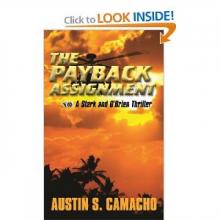 The Payback Assignment foams-1
The Payback Assignment foams-1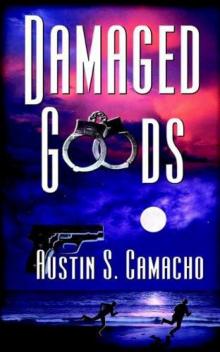 Hannibal Jones - 04 - Damaged Goods
Hannibal Jones - 04 - Damaged Goods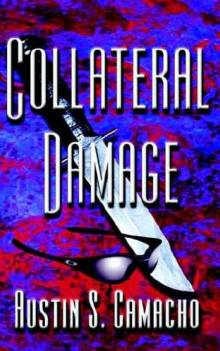 Hannibal Jones - 02 - Collateral Damage
Hannibal Jones - 02 - Collateral Damage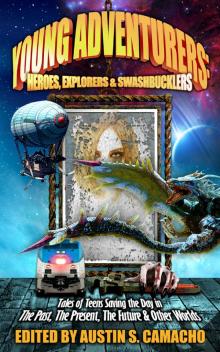 Young Adventurers
Young Adventurers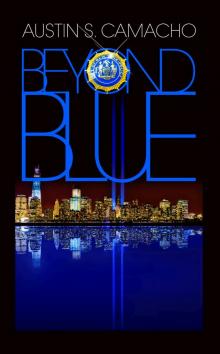 Beyond Blue
Beyond Blue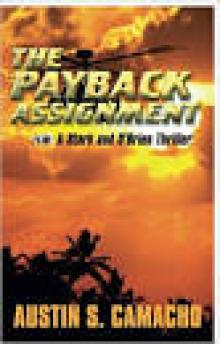 The Payback Assignment (Stark and O'Brien Thriller Series)
The Payback Assignment (Stark and O'Brien Thriller Series)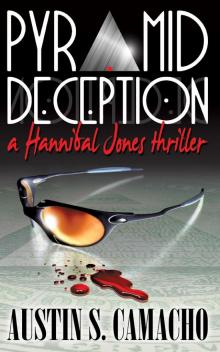 Pyramid Deception
Pyramid Deception Collateral Damage
Collateral Damage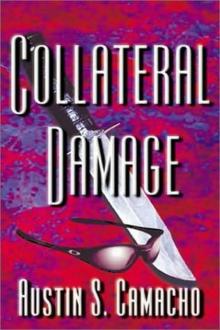 Collateral damage hj-2
Collateral damage hj-2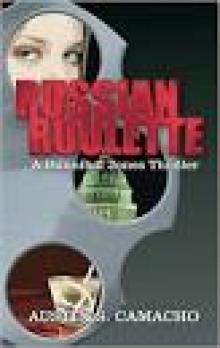 Russian Roulette (Hannibal Jones Mysteries)
Russian Roulette (Hannibal Jones Mysteries)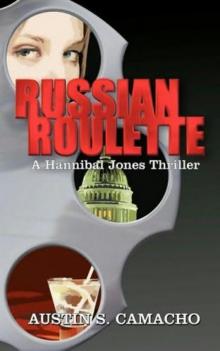 Russian Roulette hj-5
Russian Roulette hj-5